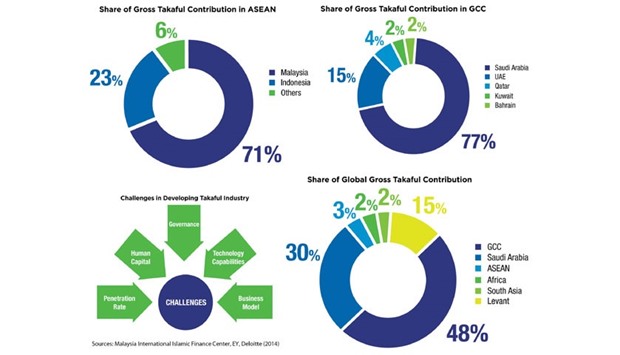While Islamic finance has seen tremendous growth and increasing acceptance in the conventional banking market in the recent past, the Islamic insurance, or takaful, industry still stands quite in the former’s shadow.
This is, however, supposed to change now as takaful is beginning to gain momentum and the sentiment in the insurance sector has noticeably changed towards this new competition, not at least through clearer regulations in important markets.
There are varying accounts on how exactly the takaful market will look like in the coming years, but all of them forecast significant growth. For example, a report commissioned by the Dubai Centre for Islamic Banking and Finance and released at the 2015 Global Islamic Economic Summit held in Dubai last October said the sector is poised to reach a value $52.5bn by 2020. Other industry observers, such as consultancy Deloitte, put the global takaful market at around $26bn by the end of 2015 and project it to surpass $42bn by 2020.
Notwithstanding the differing numbers and compared to the entire Islamic finance industry, which is now valued at over $2tn in assets, the size of the takaful sector is still small. It has a market share of just around 1.3%, which indicates strong growth potential judging by the expansion of other Islamic finance segments.
The main segments of takaful are, like with conventional insurers, life insurance and general insurance of property and risk. The difference is: For takaful to be Shariah-compliant, it has to be based on the principle of mutual assistance. Policyholders contribute a sum of money to a common pool of funds managed by a takaful management company, which is then used to pay for claims made by individual policyholders.
The surplus amount is used for making Islamic investments, which earn higher profits for the policyholders. At the end of the takaful term, the excess amount is returned to the policyholders, along with the profits earned through the Islamic investments.
The main market for takaful remain the Gulf Cooperation Council (GCC) countries and Muslim-dominated countries in Southeast Asia. The GCC has developed into a fertile ground for takaful companies, experiencing continuous double-digit growth over the past decade. In 2014, gross takaful contribution in the GCC reached more than $8.9bn.
Within the region, Saudi Arabia dominates the takaful industry, accounting for over 77% of the region’s total contribution. The UAE, meanwhile, has caught up to the second largest takaful market in the GCC with 15% market share after it introduced new regulations for takaful operators with regards to capital requirements, a minimum guarantee fund, limitations on the type of assets into which an takaful operator may invest, as well as the necessity to establish internal governance structures. Qatar contributed 4% to the takaful market share in the GCC region and collected total gross takaful contribution of $384mn as per 2014, which is projected to reach $577mn in 2016.
Southeast Asia is the second largest takaful market, accounting for around 30%, or an estimated $4.2bn, of the global takaful contribution in 2014, a recently released report on the global takaful market by the Malaysia International Islamic Financial Centre (MIFC) revealed. More than 90% of the takaful market is held by Malaysia and Indonesia.
The same report sees future potential for takaful in Africa, namely in North African countries, as well as in Sudan, Kenya and Nigeria, and “huge untapped potential” in Europe, namely in the UK, France and Germany with their large Muslim communities which currently don’t have much choice in Shariah-compliant insurance solutions but a few life insurance savings plans.
However, on the road to a future mass market, the takaful industry growth also brings with it “challenges in many aspects,” the MIFC reports notes and names them as “low penetration rate, shortage of human capital, inadequate technology capabilities, ineffective governance practices and lack of innovation in business model for new market niches,” issues that regulators and lawmakers are called on to resolve.

While Islamic finance has seen tremendous growth and increasing acceptance in the conventional banki
